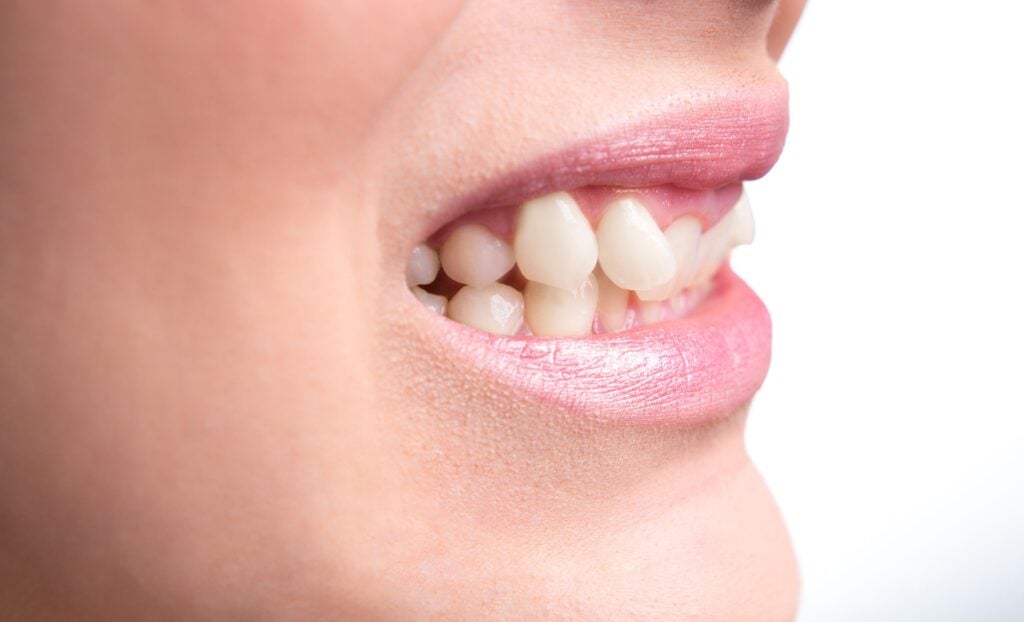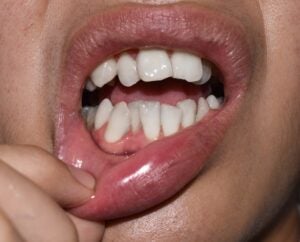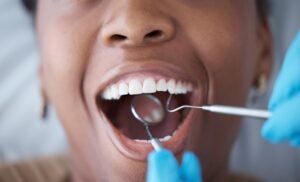-
Is Your Bite Sabotaging Your Smile? How Misalignments Affect Your Oral Health

How Bite Issues Affect Your Oral Health
When you think about the perfect smile, straight white teeth probably come to mind. But there’s more to a healthy mouth than just appearance. Your bite—the way your upper and lower teeth come together—greatly affects your oral health. A misaligned bite, also known as malocclusion, can negatively impact your teeth, gums, jaw, and even digestion. Learn about the most common bite problems and how they affect your mouth.
Continue reading “Is Your Bite Sabotaging Your Smile? How Misalignments Affect Your Oral Health”
-
8 Tips for Healthy Teeth in 2025

A healthy smile never goes out of fashion. If you’re looking to take better care of your teeth in 2025, follow these eight tips to promote great oral health this year. Continue reading “8 Tips for Healthy Teeth in 2025”
-
The Impact of Stress on Oral Health
 Stress and Your Oral Health
Stress and Your Oral HealthYou probably know that stress can negatively impact your health, with chronic stress manifesting in a wide variety of health conditions. From disturbing your sleep to increasing your risk of heart attack or stroke, the results of poorly managed stress are a problem for your whole body. Did you know that stress also has a negative impact on your oral health? Continue reading “The Impact of Stress on Oral Health”
-
How to Handle Dental Issues When You’re Traveling for the Holidays
 The upcoming holidays are an excellent time to travel, visit family and friends, and relax. But what happens if a dental issue springs up while you’re not at home? This kind of emergency can cause total panic. Are there ways to handle dental issues while you’re traveling? Are there ways to avoid dental problems? Here are some tips on how to handle dental issues while traveling.
The upcoming holidays are an excellent time to travel, visit family and friends, and relax. But what happens if a dental issue springs up while you’re not at home? This kind of emergency can cause total panic. Are there ways to handle dental issues while you’re traveling? Are there ways to avoid dental problems? Here are some tips on how to handle dental issues while traveling.Continue reading “How to Handle Dental Issues When You’re Traveling for the Holidays”
-
How Crowded Teeth Affect Your Oral Health
The Impact of Crowded Teeth
 If you have teeth that don’t seem to fit into your mouth, it probably makes you feel self-conscious about the way you look. Would it surprise you to learn that crowded teeth can affect more than just your self-esteem? Beyond the aesthetic impact, crowded teeth can lead to an increased risk of tooth decay, excessive wear, speech problems, and even TMJ disorders. Let’s take a look at the effects of crowded teeth, and how you can solve the problem.
If you have teeth that don’t seem to fit into your mouth, it probably makes you feel self-conscious about the way you look. Would it surprise you to learn that crowded teeth can affect more than just your self-esteem? Beyond the aesthetic impact, crowded teeth can lead to an increased risk of tooth decay, excessive wear, speech problems, and even TMJ disorders. Let’s take a look at the effects of crowded teeth, and how you can solve the problem.
Continue reading “How Crowded Teeth Affect Your Oral Health” -
The Connection Between Oral Health and Systemic Diseases
The Impact of Oral Health on Your Overall Health
 For years, scientists have been studying the link between oral health and overall health. While research is still ongoing, there are certain connections that are now well-documented. For example, significant associations have been found between periodontal disease and conditions like diabetes, cardiovascular disease, and kidney disease. The common thread linking these diseases is inflammation, and chronic low-level inflammation contributes to oral issues and issues like heart disease, cancer, and cognitive decline. Understanding these connections underscores how important it is to maintain good oral health, in order to promote overall well-being.
For years, scientists have been studying the link between oral health and overall health. While research is still ongoing, there are certain connections that are now well-documented. For example, significant associations have been found between periodontal disease and conditions like diabetes, cardiovascular disease, and kidney disease. The common thread linking these diseases is inflammation, and chronic low-level inflammation contributes to oral issues and issues like heart disease, cancer, and cognitive decline. Understanding these connections underscores how important it is to maintain good oral health, in order to promote overall well-being.
Continue reading “The Connection Between Oral Health and Systemic Diseases” -
Oral Benefits of Saltwater Rinse
Mouthwash or Saltwater?
 Do you use mouthwash? It is effective in freshening breath and cleaning areas you can’t reach by simply brushing and flossing. However, if you want a rinse that addresses a wider array of oral concerns, a saltwater rinse might be a better bet. Saltwater is known for its healing properties, and rinsing with saltwater can even positively impact your respiratory health. Here, we take a look at the benefits of incorporating a saltwater rinse into your oral health routine.
Do you use mouthwash? It is effective in freshening breath and cleaning areas you can’t reach by simply brushing and flossing. However, if you want a rinse that addresses a wider array of oral concerns, a saltwater rinse might be a better bet. Saltwater is known for its healing properties, and rinsing with saltwater can even positively impact your respiratory health. Here, we take a look at the benefits of incorporating a saltwater rinse into your oral health routine.
Continue reading “Oral Benefits of Saltwater Rinse” -
Bad Breath: Causes and Remedies
The Problem of Bad Breath

Medically known as halitosis, bad breath is a problem that can happen to anyone. It is an embarrassing issue, and can cause anxiety, especially when it’s not easily remedied with gum, mints, or mouthwash. In many cases, halitosis can be remedied by keeping the mouth scrupulously clean. In other cases, it’s not that simple. Here, we’ll discuss some of the causes of bad breath, as well as some helpful remedies. Continue reading “Bad Breath: Causes and Remedies”
-
What Should You Do After a Root Canal?
What Should You Do After a Root Canal?
A root canal procedure is often essential to relieve pain and save a tooth that has been severely infected or decayed. While the procedure itself can be daunting for many, understanding the root canal recovery process is crucial for ensuring a quick and smooth healing period. This article delves into the best practices and tips for post-root canal care, ensuring that your recovery is as effective and comfortable as possible.
Continue reading “What Should You Do After a Root Canal?”
-
Root Canal Myths Debunked: Is It Considered Oral Surgery?
Clearing Up Concerns About Root Canals
Few dental treatments induce as much anxiety and confusion as root canals. Amidst swirling myths and common misconceptions, one recurring question stands out: Is a root canal oral surgery? Despite common confusion, the simple answer is yes. In this article, we will explore why root canals fall under the category of oral surgery, debunk popular myths surrounding the procedure, and clarify what patients can expect. Continue reading “Root Canal Myths Debunked: Is It Considered Oral Surgery?”
RECENT POSTS
categories
- Uncategorized
- Cosmetic Dentistry
- Veneers
- Healthier Teeth
- Teeth Whitening
- Dental Health
- Video
- Dental Emergencies
- Invisalign
- Dental Implants
- Root Canal
- Sedation Dentistry
- Infographic
- Dental Crowns and Bridges
- Dental Anxiety
- Gum Disease
- COVID-19
- Bad Breath
- New York Dentist
- Cut out sugar
- General Dentistry
- Oral Health
- Oral Cancer
- Dry Mouth
- Gum Health
- Toothache
- Dental Sealants
- Cavities



